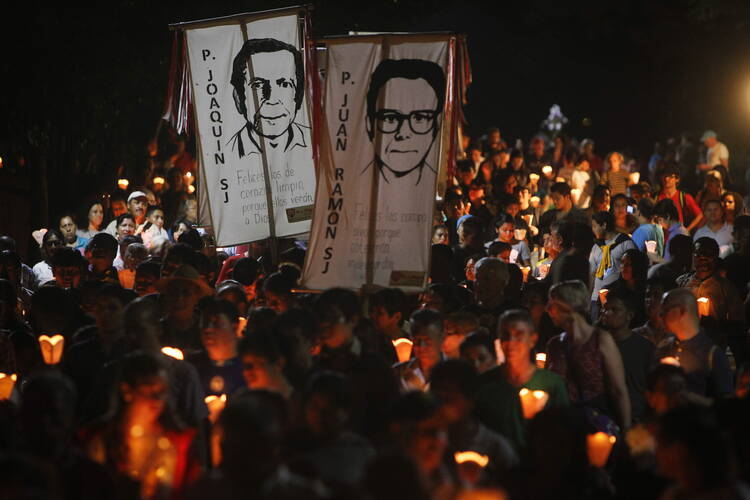SAN SALVADOR, El Salvador (AP) — Jesuits in El Salvador asked the government Monday to commute a former military colonel's prison sentence for the 1989 killings of six priests from their order and two female employees.
In presenting their request to the Ministry of Justice and Public Security, the Society of Jesus also reiterated that it forgives former Col. Guillermo Benavides, who has 26 years remaining on his 30-year sentence.
"We make this petition on the basis that, from our perspective, the process of truth, justice and reparations has been fulfilled," said Andreu Oliva, a priest who also is director of Central American University.
Jesuits believe Benavides is a "scapegoat" for those who ordered the 1989 UCA massacre and were never punished.
There was no immediate comment from the ministry or other government entities.
Benavides and a lieutenant, both members of an elite, U.S.-trained battalion, were convicted in the killings but then freed under a 1993 amnesty decree covering crimes during the Central American nation's civil war. The Supreme Court declared the amnesty unconstitutional in 2016, and Benavides returned to prison despite appeals from his lawyers.
Jose Maria Tojeira, a priest who directs the university's Human Rights Institute, said there several reasons for seeking Benavides' freedom.
"We are aware of his regret and his admission of the error," Tojeira said, adding that the 74-year-old ex-soldier "no longer represents a danger to the Salvadoran people."
Tojeira also said the Jesuits believe Benavides is a "scapegoat" for those who ordered the massacre and were never punished. The Jesuits consider the case against the killers closed but continue to seek clarity on the intellectual authors of the crime.
Among those sought in the case are former Col. Inocente Orlando Montano Morales, who oversaw El Salvador's National Police as vice minister for public security in the 1980s. Montano was recently taken from North Carolina to a jail in Virginia where he is fighting extradition to Spain, which wants to try him because most of the slain priests were Spaniards.
Spanish priests Segundo Montes, Ignacio Ellacuria, Ignacio Martin Baro, Armando Lopez, Juan Ramon Moreno and Salvadoran priest Joaquin Lopez were killed in November 1989 along with the two employees, Elba and Celina Ramos. Troops made the victims kneel and then shot them in the head in the garden of their residence on the Central American University campus.
Outrage over the massacre prompted a U.S. congressional investigation which found that members of the force that killed the priests had received training from the U.S. military.
Copyright 2017 The Associated Press. All rights reserved. This material may not be published, broadcast, rewritten or redistributed.










